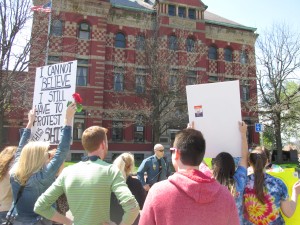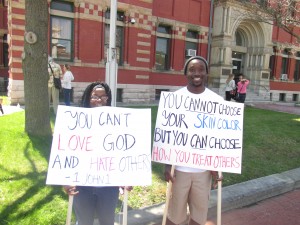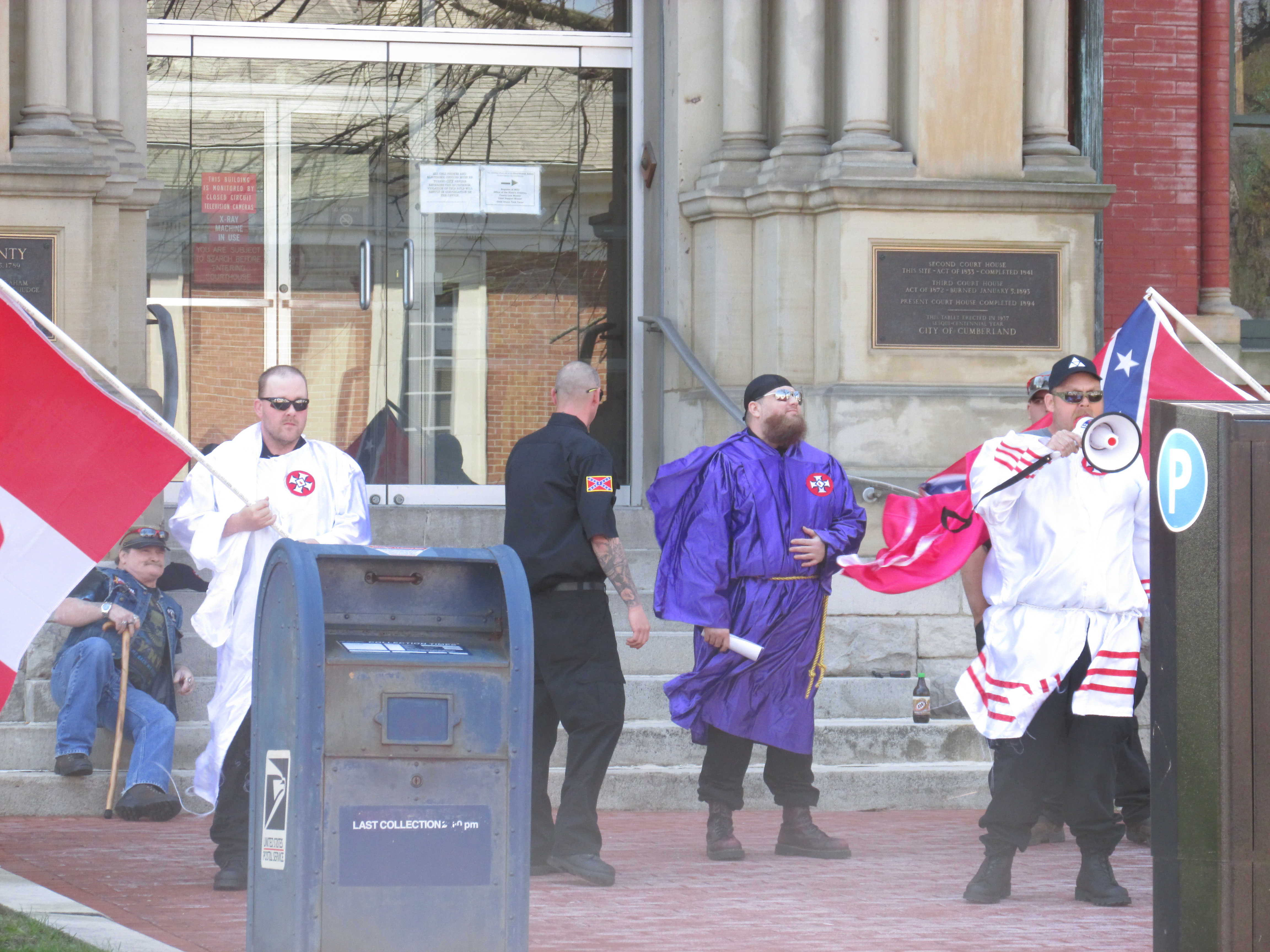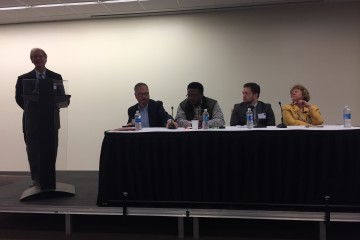KKK Plans Return to Cumberland
On April 26, the Traditional Rebel Knights of the Ku Klux Klan organized a rally outside of the Cumberland courthouse on Washington Street. With over 150 participants standing in opposition of the KKK, Cumberland showed that the city is no place for hate based on race, sexual orientation, or religion. However, the city might not have a say.
According to their website, the Klan called the rally in Cumberland a success and plans to return. The site lists that it had over 40 supporters present at the rally, however, where these supporters were is unknown. Interviewed witnesses of the demonstration did not see any of these supporters. The site also claims it held a “meet and greet that followed in the courthouse parking lot.” However, no protesters actually spoke with the Klansmen outside of yelling negative comments towards the group.
The Klan plans to return to Cumberland and make the city a “yearly rally stop.” The website read, “Next year’s rally will be bigger and better since we was able to secure private land in the area where we plan to hold a triple cross lighting and BBQ after the public rally in town.”

Even though over 150 participants were against them, the group does not appear to consider the a failure. Following the rally, The Bottom Line interviewed Matthew Daud, the Imperial Wizard and leader of the Traditional Rebel Knights, through email. When asked why he viewed the Cumberland rally a success, Daud said, “Anytime we have the chance to spread our message to our people is a great day for us…”
According to the Traditional Rebel Knights’ website, the group “is a law abiding second era Christian brotherhood.” There were seven total KKK members that participated in the Cumberland rally, although there were originally intended 15. Daud said, “[Less members showed] due to another rally that was going on. We had sent other members to support that Klan’s function as well.” He claimed there was a rally in Virginia.
Widely considered to be a hate group, KKK members are known for holding strong in their beliefs against Jewish people, the LGBT community, African Americans, Catholics, and various other groups. Daud believes that the United States has been “brain washed by the Jewish propaganda for many years.” He said, “Just do a little digging online or at your local library and you will see this is true.” The Bottom Line did some “digging” into the website Daud suggested and found only anti-Semitism viewpoints with vague support evidence.
In modern America, it seems reasonable to question exactly what the KKK is seeking in a world radically different than when the group was created. However, their response and general opinions on racial issues predate the 21st century. Daud said, “We are pushing for racial segregation.”
Daud continues to hold strong to his views of white supremacy. He said, “I am a white separatist now. I believe any race should have the right to develop their own culture separately on their own merit without the help of the government or at the tax payer’s expense. There should not be a government hand out because of the color of your skin.”
To follow up on this comment, The Bottom Line investigated specific statistics concerning the aforementioned “government hand out.” According to a January 2014 report from the Department of Commerce, there are 12,800,000 Americans on welfare. Of these Americans, 38.8 percent are Caucasian, 39.8 percent are African American, 15.7 percent are Hispanic, 2.4 percent are Asian, and 3.3 percent are under the “other” category. The difference between the Caucasian recipients and African American recipients is only about 1 percent or 128,000 individuals. However, white percentage of welfare recipients is much higher than the Asian and Hispanic. While the populations of these ethnicities in the US differs,the claim that there is is “government handout” based on ethnicity is completely unfounded.
Although Daud implied African Americans should not receive a “government hand out,” in a later interview, he voiced opposition to social government programs, like welfare, in general. He provided several regulations he wanted in place. He said, “Take welfare [for example]. There should be time limits placed on how long you can draw cash assistance, food stamps, medical and housing programs… We have a problem in this country with too many people making a career living off the system.”
Regardless of the Klan’s archaic viewpoints, the United States has long been a “melting pot,” home to almost every ethnicity, language and culture. According to the United States Census Bureau as of 2012, it is estimated that about 77.9 percent of the United States’ population is white, 16.9 percent are Hispanic or Latino, 13.1 percent are African American, 5.1 percent are Asian, 1.2 percent are American Indian, and 0.2 percent are Native Hawaiian and other Pacific Islander. These numbers do not include the 2.4 percent of Americans who have more than race. Locally, in 2012, 60.8 percent of Marylanders were white, 30 percent African American, 8.7 percent Hispanic or Latino, 6 percent Asian, 0.5 percent American Indian, and 0.1 percent Native Hawaiian and other Pacific Islander.

Taking this diversity into account, it seems impossible that Klansmen would not interact with these individuals at some point. In response to this logic, Daud stated, “Like I stated earlier, I am a white separatist, so I don’t have much contact with these other groups of people with the exception of some public places. Make no mistake -the negro is not my friend. The queer is not my friend. The illegal immigrant is not my friend. But we never act out upon these people, unless provoked.”
The Southern Poverty Law Center lists 15 groups in Maryland as hate groups, but the Traditional Rebel Knights are not included in this list. However, according to comments yelled during the Cumberland rally, those participating against the KKK disagreed. However, Daud commented, “No, we don’t consider our group anything besides the Ku Klux Klan. If they feel the need to label us a hate group, so be it.”
Racially-charged hate crimes continue to impact individuals, as well as entire communities. In 2012, the Federal Bureau of Investigation reported there were 5,790 hate crime incidents reported. Within these incidents, there were 7,164 victims, including individuals, businesses, and societies. Of these crimes, about 48.3 percent of these incidents were based on race, 19.6 percent on sexual orientation and 19 percent on religion.
Alicia Clay, a senior at Frostburg State University majoring in exercise and sports science, participated in the rally against the KKK. She said, “I chose to come to show support for not only people of color, but for all people who have been discriminated against.”
During the rally, Clay held a sign that read, “You cannot hate others and love God. 1 John 1.”
Clay felt the rally was a success because of the participation from locals. She said, “[The fact that] the rally had more support for equal rights [than the KKK] shows Cumberland as whole is against racism and the fact that we won’t back down.”
When adding additional comments about racial equality, she remarked, “We have the same bones, the same blood. We don’t get to choose our color [of skin].”
While the KKK continues to live in the past, the Southern Poverty Law Center estimates there are only about 5,000 to 8,000 KKK members currently, or one to two percent of the American population. The KKK may pose nothing but a small threat to peace, but, unfortunately, this racial, sexual and religious hate continues to impact the world, as well as anyone caught in its way.
Featured Image: Traditional Rebel Knights shout their propaganda during Cumberland rally (Erin Gingerich/ TBL).





3 Comments